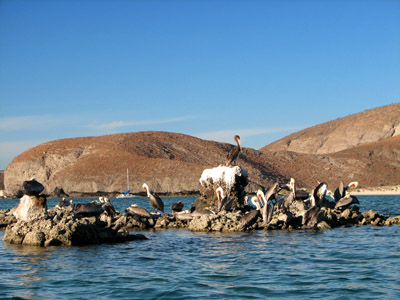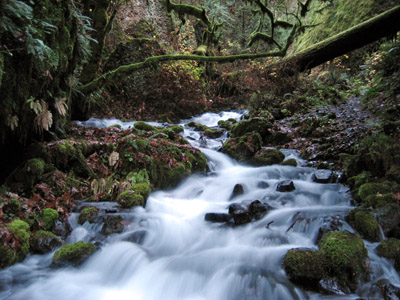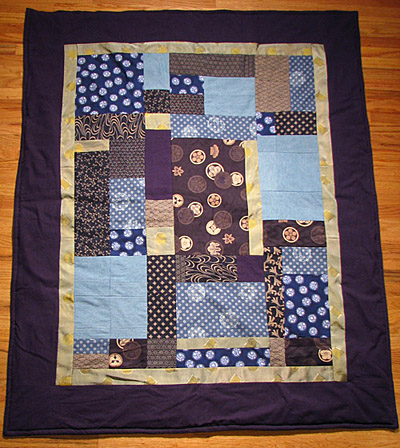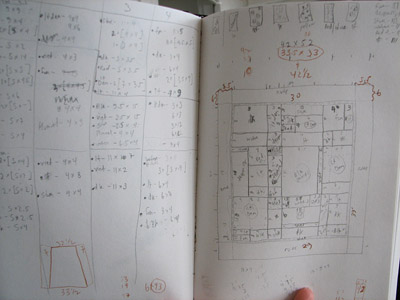
[Puerto Balandra, Mexico 2005]
We were often asked, “How do you afford it?” In fact, that’s probably the most common question we got when we met a land tourist or cruise line passenger on the beach. Usually the people asking the question obviously spent more on their 10 day vacation then we did all year. It can’t be answered in any meaningful way because every person has a unique economic situation and different priorities. However, since we bought the boat, went cruising, then sold it all in a relatively short period of time we can answer the more quantifiable question: “Hom much did it cost you?”
Neither of us are accountants but due to the wonder of internet banking records I can come up with a pretty good estimate. The following table lists all the major expenses we encountered from buying the boat, storing it for a year, cruising for a year and a half, then selling it. We owned the TimeMachine for almost exactly 3 years and lived exclusively aboard for 18 months.
| Buying the TimeMachine |
| Asking Price |
$32000 |
| Survey value |
$30000 |
| Purchase Price |
|
$27000 |
| Taxes1 |
|
$300 |
| Sold included trailer |
|
-$100 |
| Sold included 9.9 hp outboard |
|
-$250 |
| New Tohatsu 6hp Outboard |
|
$1200 |
| Outboard parts (kits and spares) |
|
$300 |
| Inflatable Kayak |
|
$400 |
| Used 10′ Porta-bote |
|
$850 |
| Hand held GPS, VHF, Binoculars |
|
$350 |
| Portable Generator6 |
|
$400 |
| Cruising guides and charts |
|
$300 |
| EPIRB |
|
$800 |
| Paint, Epoxy and supplies |
|
$600 |
| Fabric and hardware for trampolines and other miscellaneous projects |
|
$1100 |
| Coyote Point Slip 1yr |
$200/month |
$2400 |
| Boat US Insurance (1st year only)3 |
$300/yr |
$300 |
| Mexican Liability Insurance (1 year)4 |
$200/yr |
$200 |
| Mexican Fishing Licenses |
|
$230 |
| Storage unit in Foster City |
$70/month |
$1680 |
| Health Insurance2 |
varied |
$2240 |
| 6 week trip to US in summer ’06 |
|
$3000 |
| Santos watching boat/cleaning bottom |
$50/month |
$150 |
| Panama Canal Transit |
|
$650 |
| New Tohatsu 15hp outboard |
|
$2000 |
| Sold EPIRB |
|
-$600 |
| Sold Porta-bote |
|
-$750 |
| Sold 6hp Tohatsu Outboard |
|
-$750 |
| General Expenses5 |
|
$23000 |
| Selling the TimeMachine |
| Survey Value |
$28000 |
| Asking Price |
$25000 |
| Selling Price |
|
-$22000 |
| Broker Fee |
|
$1500 |
| Total |
|
$46500 |
1 We were able to successfully avoid most of the sales taxes with some paperwork hokey pokey.
2We were initially paying $70/month/person but they dropped us after a year due to a payment mix up. We then found international medical coverage that was only $300/year/person excluding treatment in the US. In the end this was a mistake because those laws which guarantee coverage of pre-existing conditions when you have continous coverage don’t apply if the coverage is through a foreign company.
3Liability insurance is required to rent a slip at nearly any marina in the US. Boat US doesn’t offer insurance south of Ensenada so we allowed the policy to lapse as we were leaving.
4We were only asked for this a couple of times. I think we could have gotten away without it. After leaving Mexico we were completely uninsured.
5This estimate is based on our bank statements and does not included US income taxes paid during this period. It includes all other incidental expenses like groceries, eating out, fuel, booze, and beer. There are probably things in here that deserve to be line items but I forgot (or just got tired of revising the table).
6The portable generator was a total luxury and it’s primary use was to keep the camera and laptop batteries charged. We also used it to run power tools. One disadvantage to using an outboard for power is that they aren’t very efficient at charging your batteries.
|
I may have missed a few things but the error is no more than a couple thousand. I can confidently say that the entire experience cost no more than $50k. The cost of ownership of the boat itself (discounting living expenses, fuel costs, etc.) was only about $6000 per year. I expect that this would be an extremely low number by industry standards.
Looking over the numbers a few obvious things jump out. Keeping the boat at the dock, even at the bargain price (for the SF Bay) of $200 per month, ads up quickly. Dock fees and insurance represented %10 of the purchase price of the boat per year. After leaving California, we didn’t pay marina fees of any kind. This is important because marina fees are almost always more expensive than we are accustomed to in the US. Remember that most of the world doesn’t have a large middle class and marinas are built for the rich.
Since we were able to store the boat at my Dad’s place in Texas for free, it may have been tempting to hold out for a higher selling price. However, we felt lucky to have sold it so quickly. A boat is almost never an investment and a neglected boat is probably the worst investment of all. Had we planned to stay in Texas or if we weren’t expecting a baby we may have made different decisions.
The TimeMachine was expensive for the amount of living space provided. An equally capable boat could be found for under $20k and maybe as low as $10k. Do a quick search on yacht world if you don’t believe it. Having a small and humble looking boat will save you money in many ways. The officials are much less likely to gouge you and/or ask for bribes and the local people will treat you better.
Buying a fixer upper can be tempting but is probably false economy. The extra cost of fixing the boat up, storage, and insurance will probably quickly eat up any initial savings even if you consider your own time to be free. The same thing goes for purchasing your boat too far in advance. You’re better off keeping a small day sailer until you are almost ready to go. That goes double if, like me, you aren’t much of a day sailor (Over the horizon or nothing!). Unless you live aboard, 5-10 years upkeep on your 40′ dreamboat will cost years of a cruising budget.
There are lots of people out there right now doing it for just a fraction of what it cost us. A practical minimum budget is probably around $800 per month for 2 people not counting the initial expense of the boat. You don’t need most of the crap in the west marine catalog. Our navigation electronics consisted of a hikers model hand held gps, a VHF radio, and a depth sounder. These are essentials but we met people without radios and at least one couple without a depth sounder. GPSs are so cheap these days that going without is silly, but I’m sure there are people who eschew those as well. We later bought a SSB/short wave receiver for listing to weather.
I’m not sure who said it but you’ve probably heard the maxim: “go cheap, go now!” That’s probably the best advice you’ll get. Ignore everyone (and it is nearly everyone) whose advice consists solely of things to buy. Whatever it is, chances are you don’t need it.









